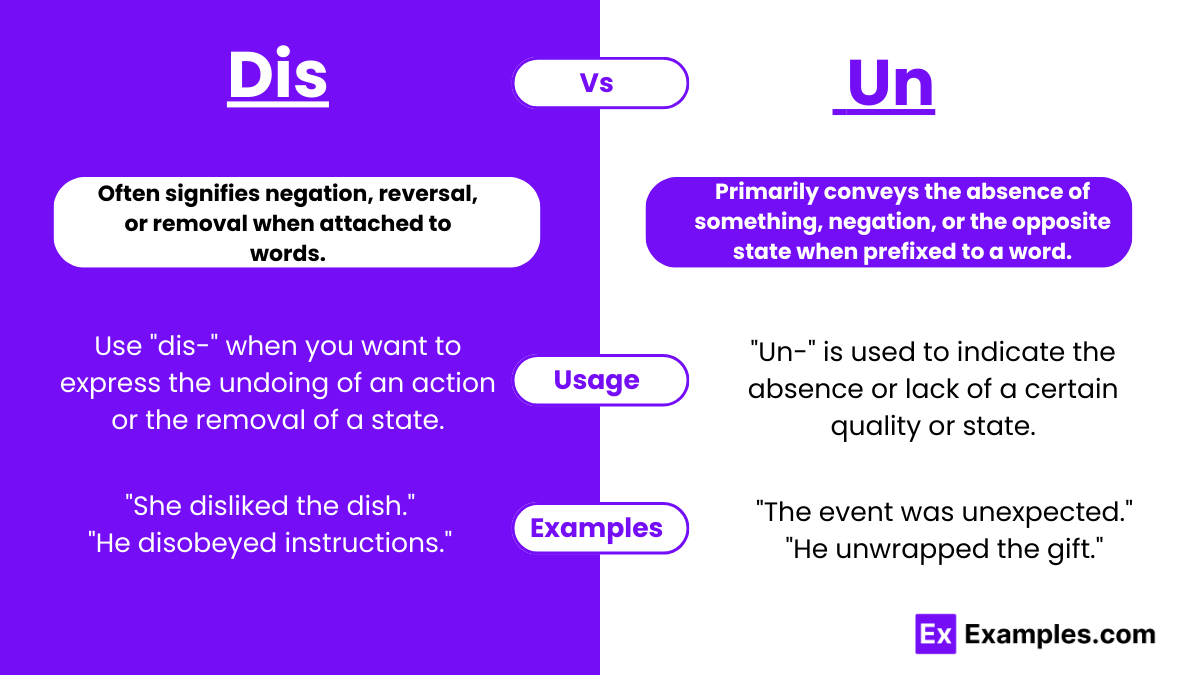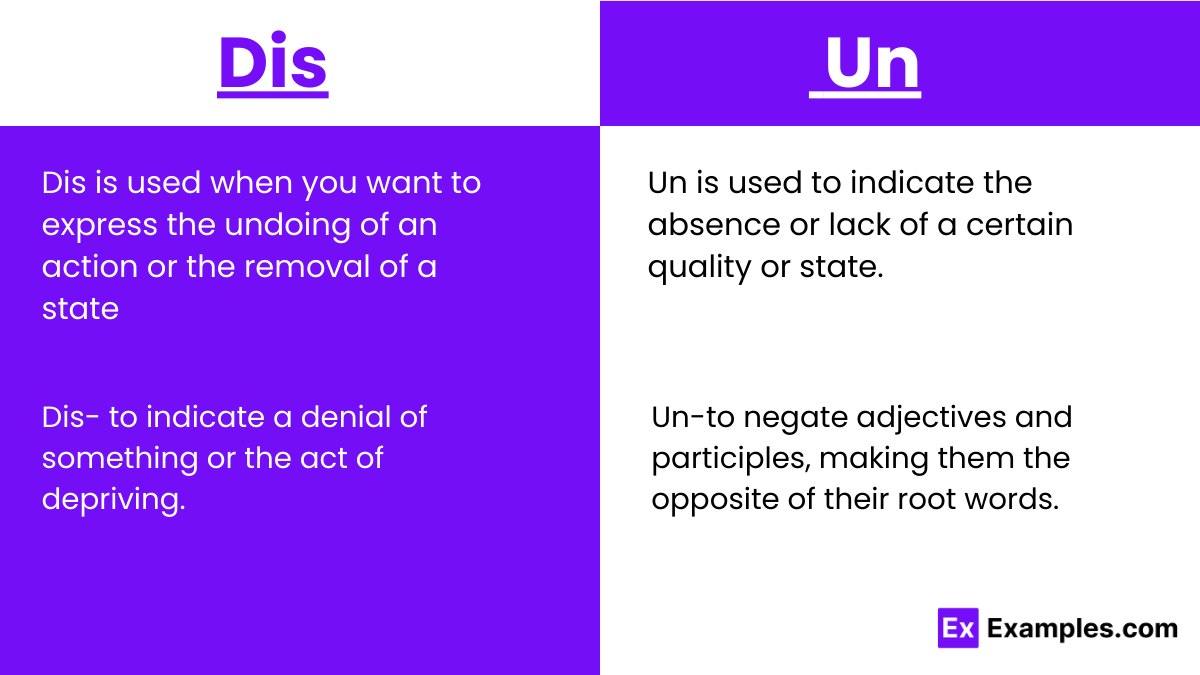Dis vs Un – Examples, Differences, Usage
The prefixes “dis” and “un” serve as linguistic keystones, subtly yet significantly altering the meanings of the words they precede. Daily, we navigate conversations peppered with words like “disappointed” or “uncomfortable,” seldom pausing to consider the weight these three-letter prefixes carry. Their ability to negate or invert the essence of a word is a testament to the dynamic and adaptive nature of the English language, offering a glimpse into the complex mechanics of verbal expression. This exploration seeks to unravel the intricacies of “dis” and “un,” shedding light on their distinct impacts and guiding students towards a nuanced understanding of their usage.
While both “dis” and “un” commonly signify negation or reversal, their application is nuanced by subtle differences in meaning and context. “Dis,” often found at the helm of verbs, hints at the act of undoing or the presence of an opposing force, while “un” extends its reach to adjectives and verbs alike, embodying absence or the removal of a particular state. Through examining these prefixes, one uncovers the layers of meaning they add to words, enhancing both the richness of vocabulary and the precision of communication. As we delve deeper into the realms of “dis” and “un,” we equip ourselves with the tools to articulate thoughts with greater clarity and depth, enriching our linguistic tapestry with every word.
Dis and Un Meaning
The prefixes “dis” and “un” play a pivotal role in the English language, each carrying its own nuances and applications.
Dis- Often signifies negation, reversal, or removal when attached to words. It transforms the base word into its opposite or denotes the act of undoing the action suggested by the root word. For example, “dislike” means not to like, and “disassemble” means to take apart. The prefix “dis-” is commonly used with verbs, nouns, and adjectives.
Un- Primarily conveys the absence of something, negation, or the opposite state when prefixed to a word. It is frequently used with adjectives and participles, turning them into their negative forms. For instance, “unhappy” means not happy, and “undone” suggests that something has not been done or has been reversed.
Understanding the subtle distinctions between “dis-” and “un-” can greatly enhance clarity and precision in communication, allowing for the expression of complex ideas and emotions with simple linguistic tweaks.
Summary
Starting off, the prefixes “dis” and “un” both subtly alter the meanings of words, though in slightly different ways. “Dis” typically negates or reverses the original meaning, often used with verbs to signify the reversal of an action. “Un,” while also commonly denoting negation, extends its reach to imply a lack or removal of a certain quality, depending on the root word it precedes. In this discussion, we will explore how these prefixes contrast with each other and demonstrate their application through various examples, enhancing your writing by adding depth and precision to your language use.
Difference Between Dis and Un
The prefixes “dis” and “un” are fundamental in altering the meanings of words in English, adding layers of negation or reversal. While they share the common trait of turning words into their opposite forms, their usage and implications vary subtly across different contexts. “Dis” often implies a more active undoing or removal, while “un” typically suggests a lack or absence. By understanding these nuances, one can employ these prefixes more effectively to convey precise meanings. Here’s a comparative look at “dis” and “un” across ten different aspects:
| Aspect | Dis- | Un- |
|---|---|---|
| Meaning | Generally means “not,” “opposite of,” or “apart.” | Usually conveys “not,” “lack of,” or “the absence of.” |
| Common Usage | Often used with verbs, nouns, and adjectives. | Primarily used with adjectives and participles. |
| Connotation | Implies an action of reversal or removal. | Suggests negation or absence without the notion of action. |
| Examples | Disagree, disassemble, disconnect. | Unhappy, unclear, unable. |
| Prefix Origin | Derived from Latin. | Derived from Old English. |
| Effect on Words | Can change the word class (e.g., noun to verb). | Typically retains the word class (adjective remains an adjective). |
| Relation to Root Word | May not always be related in meaning to the root word. | Usually closely related to the meaning of the root word. |
| Frequency in Language | Less common than “un-.” | More common in everyday language. |
| Phonetic Integration | Can result in double consonants (e.g., “dissatisfy”). | Generally maintains single consonants (e.g., “unlock”). |
| Compatibility | Selectively combines with certain words based on etymology. | Broadly applicable to a wide range of words. |
Understanding these distinctions empowers writers to choose the most appropriate prefix to convey the exact shade of meaning they intend, enhancing the precision and expressiveness of their language.
Examples of Dis and Un
Examples of “Dis-“
- The magician managed to disappear in a cloud of smoke.
- Efforts to disarm the old lawnmower proved more difficult than anticipated.
- The article aimed to discredit the new theory, but it only gained more followers.
- She had to dismantle the entire argument and start from scratch.
- The new evidence could potentially disprove the long-held scientific belief.
Examples of “Un-“
- The room was unlit, making it hard to find the switch in the dark.
- His remarks were unsolicited, but they offered a new perspective.
- The path was unmarked, leaving hikers to guess which way to go.
- She felt unsettled by the strange noise outside her window at night.
- The document remained unsigned, leaving the agreement in limbo.
When to Use Dis and Un
Choosing between “dis-“ and “un-“ requires understanding their nuances and the contexts in which they are used. Here’s a guide on when to use each prefix:
When to Use “Dis-“
- Reversal or Removal: Use “dis-” when you want to express the undoing of an action or the removal of a state. Example: “disassemble” (to take something apart).
- Negation: “Dis-” can negate the meaning of a word, often turning it into its opposite. Example: “disagree” (to not agree).
- Denial or Deprivation: Use “dis-” to indicate a denial of something or the act of depriving. Example: “disinherit” (to deprive of inheritance).
When to Use “Un-“
- Absence or Lack: “Un-” is used to indicate the absence or lack of a certain quality or state. Example: “unhappy” (not happy).
- Reversal or Removal: Similar to “dis-,” “un-” can also denote the reversal of an action, especially when used with verbs. Example: “untie” (to reverse the action of tying).
- Negation: Use “un-” to negate adjectives and participles, making them the opposite of their root words. Example: “unfair” (not fair).
Understanding these distinctions will help you choose the right prefix to convey the intended meaning accurately, enhancing the clarity and precision of your communication.
Commonly used words with the prefix “Dis” and “Un”
Below is a table featuring commonly used words with the prefixes “Dis-” and “Un-“. The table is organized into four columns to provide a clear comparison between these prefixes.
| Dis- Prefixes | Dis- Prefixes | Un- Prefixes | Un- Prefixes |
|---|---|---|---|
| Disagree | Dislike | Unhappy | Unable |
| Disappear | Disapprove | Unusual | Unfair |
| Disarm | Disconnect | Unsure | Unfold |
| Disassemble | Discontinue | Uncover | Unite |
| Disband | Discredit | Unravel | Untie |
| Discover | Disenchant | Unlock | Unveil |
| Disrupt | Dishearten | Unleash | Unwind |
| Displace | Disinfect | Unload | Unwrap |
| Display | Dismantle | Unpack | Unearth |
| Dismiss | Disobey | Unfreeze | Unseen |
| Dispute | Disown | Unwrap | Unheard |
| Distort | Dispel | Unfurl | Unzip |
| Distract | Disqualify | Unwind | Unplug |
| Disturb | Disregard | Unravel | Unbutton |
| Disuse | Dissolve | Unveil | Uncoil |
This extensive list of words with “Dis-” and “Un-” prefixes showcases the versatility and frequency of these prefixes in English vocabulary, highlighting their ability to alter the meanings of base words significantly.
FAQs
How Do You Use Dis and Un?
Use “dis” to express negation, reversal, or removal, commonly with verbs and nouns (e.g., disagree, disqualify). “Un” typically denotes absence or the opposite state, often with adjectives and participles (e.g., unhappy, undone). Understanding each prefix’s nuance enhances clarity in communication.
Is the Prefix Dis or Un for Comfort?
The prefix for “comfort” is “un,” forming “uncomfortable.” “Un” is used to indicate the absence of comfort, making the base adjective negative in meaning.
Where Do We Use Dis and Un?
“Dis” is used to negate or reverse actions and qualities, often found in verbs and adjectives (e.g., disconnect, disloyal). “Un” is applied to denote lack or absence, primarily with adjectives and participles (e.g., uncertain, unfinished). Selecting the correct prefix depends on the root word and desired meaning.





